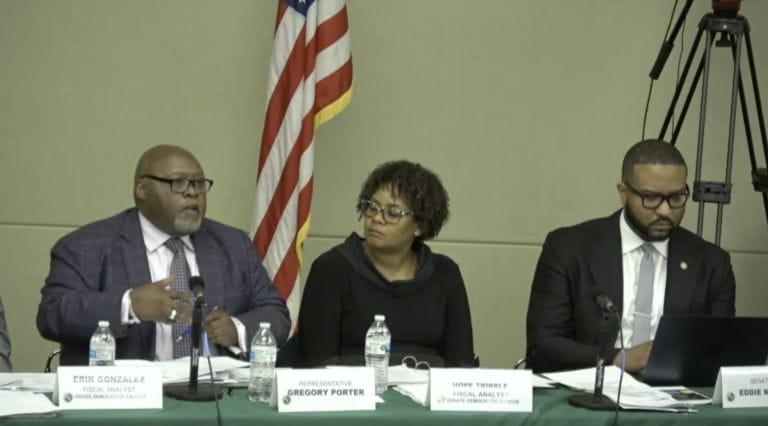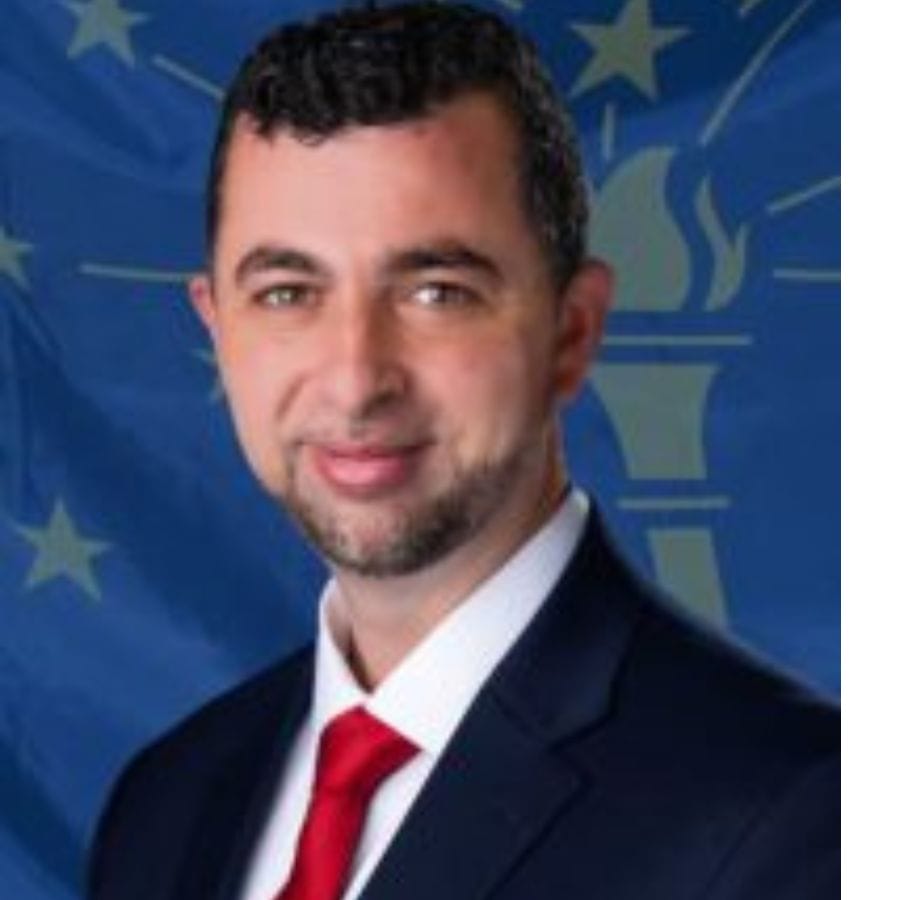FSSA Medicaid Director Cora Steinmetz spoke before the State Budget Committee on Friday, Oct. 27. 2023, in Evansville, Indiana. (Screenshot from live committee broadcast.)
Rep. Greg Porter, D-Indianapolis, repeatedly called for reimbursement rates to rise by at least another $4.
State budget regulators on Friday, October 27, 2023, approved a request from Indiana’s Family and Social Services Administration to set new reimbursement rates for autism therapy services for Hoosier children with Medicaid.
While the rate of $68 an hour is above what the FSSA originally proposed it is below an average rate of $91 an hour that has been given previously under an old formula.
The new rates will take effect Jan. 1.
But Democrats on the State Budget Committee remained skeptical over whether the rate will be enough to serve Hoosier children.
Families, multiple state lawmakers and even Lt. Gov. Suzanne Crouch have pushed back, saying the state’s first, smaller proposal of $55 an hour would have caused some therapy providers to lay off staff, reduce services or shut down altogether.
In response, the state upped its proposal to about $68 an hour. The increase is reflected in a larger reimbursement for administrative overhead costs, in addition to more money to cover time that supervisors can’t bill for.

Rep. Greg Porter, D-Indianapolis, who has spent months calling for increased reimbursement rates, emphasized Friday that the new rates “are not sufficient.” He said he’s still worried that services will be lacking for Hoosiers.
“I’m very concerned that we will not meet the needs of individuals within the state of Indiana, particularly minorities, and in rural and suburban communities, too,” Porter said. “I know there have been some bad actors, we know that. However, I don’t think that this should be so prescriptive and punitive.”
FSSA released its updated plan last month, which increased the proposed reimbursement rate for autism therapy services rendered by a registered behavioral technician (RBT) by 24% to $68.24 per hour — up from $55.19 per hour in the state’s earlier proposed rate.
The initial $55 reimbursement plan for providers for Applied Behavioral Analysis (ABA) therapy was a significant decrease from the average $91 they received before. This common form of therapy can improve social, cognitive and behavioral outcomes in some children with autism spectrum disorder, as well as the overall wellbeing of the child and their family, according to the state agency.
Budget committee approves, with reservations from some
FSSA Medicaid Director Cora Steinmetz maintained on Friday that the initial reimbursement rate was determined based on survey data provided by therapy providers. But after provider feedback, the agency elected to increase the rates for administrative overhead and supervision, she said.
Steinmetz additionally said FSSA applied a 7.5% inflation factor the last two years, and there will be a 2% inflationary adjustment applied to the reimbursement rates each year until the matter comes up again for review.
Still, Sen. Fady Qaddoura, D-Indianapolis, questioned whether the increase will be enough for clinics to remain open — and provide the best quality of services.
He specifically expressed concerns about FSSA and providers “hashing this out,” moving forward.
“Once the budget committee today consents to the agenda and it moves forward, really, there’s nothing left for the General Assembly to influence that decision moving forward. Are there any assurances you can give to the public … that more meetings, more discussions might take place?” he asked. “Is there a middle ground to reach a win-win by which you have most of these providers working in harmony with FSSA?”

In response, Steinmetz said the agency is “very committed to doing all of these rate-setting activities in a transparent and provider-informed manner.”
Rep. Ed DeLaney, D-Indianapolis, said he’s further “concerned” about the qualifications of those providing services and asked what the state is doing to ensure “adequately trained people” are working with kids. Steinmetz said FSSA officials are continuing to work out how best to adopt and apply “clinical criteria.”
Porter previously pushed for reimbursement increases of 25% or 30% more than what the state initially proposed. He made multiple calls Friday to increase the rates by another $4, which he emphasized would only cost the state $5 million more.
“I’m just very concerned about the access for minorities. We need to expand the program and take care of people in the state of Indiana,” he continued. “Another $4 — in the grand scheme of things — it’s not a whole lot of money.”
Before the budget panel gave the greenlight, Porter made a formal motion to move the reimbursement rate up to $72, but committee chairman Rep. Jeff Thompson, R-Lizton, said the motion was out of order.
Thompson offered to entertain a motion to remove the whole item from the agenda instead, but Porter declined: “I want to be solution-oriented, not an obstructionist.”
The background
Indiana’s Medicaid program didn’t start covering ABA therapy — a type of skills-based therapy beneficial to some families — until 2016. Without a precedent to set base rates, FSSA decided to pay a flat 40% of whatever providers charged the insurance policy.
The agency previously said payment of a percent of billed charges “has resulted in widely different reimbursement amounts for different providers of the same service.” Over the last three years, ABA expenditures have increased by more than 50% per year, “which is not a sustainable rate,” according to the state officials.
The agency reported that it spent $420 million on ABA claims for 6,200 children and young adults in 2022. Costs could continue to climb if a fee schedule — similar to what’s used for other services — isn’t implemented, FSSA warned.
In the third quarter of 2022, paid hourly rates for ABA services averaged $91 but ranged from $46 to $222, according to FSSA. Some of that included non-allowable costs and pushed Indiana’s reimbursement rate higher than peer states.
More than 700 comments were submitted to FSSA on its initial proposal — most of which were critical. Separately, more than 40 state lawmakers signed a letter asking Holcomb to intervene.
Parents also protested outside Holcomb’s home. The governor had earlier defended FSSA’s actions, saying it was appropriate and dependent upon feedback from stakeholders to set a statewide standard.
The article has been updated to change an FSSA misstatement.
This article originally appeared on Indiana Capital Chronicle.






